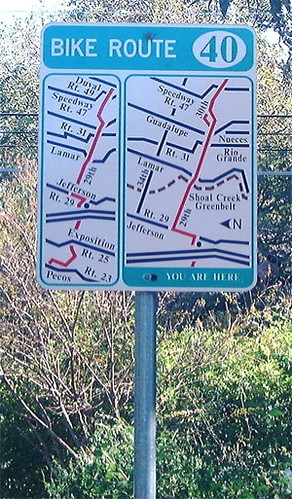Related to my point that "World-class cities don't just take, they give" in terms of how they model innovation and vision and in turn inspire other communities to strive for improvement and adopt better and best practice, the Austin American-Statesman reports on tomorrow's "State of the City" speech by Austin Mayor Steve Adler. The speech is titled "Great Cities Do Big Things."
In the spirit of accountability and evaluation, the paper reports ("What happened to the Austin savings bond, other Mayor Adler ideas?") on the status of the ideas and proposals from last year's speech. From the article:
In his first State of the City speech last year, Mayor Steve Adlerfloated various new ideas aimed at relieving the stresses that have accompanied Austin’s economic prosperity and rapid growth, including traffic congestion and the rising cost of living, most acutely felt by low-income and working-class residents.
We spoke with Adler — who said last week that he’s trying to cut down a roughly 40-page draft of his second State of the City speech, scheduled for Tuesday, titled “Great Cities Do Big Things” — to gauge the progress of some of last year’s big ideas. ...
Mayor Steve Adler’s State of the City speech starts at 7 p.m. central time, Tuesday at the Zach Theatre, 202 S. Lamar Blvd. Seats can be reserved online or in person at the mayor’s office at 301 W. Second St.The main ideas from 2015:
To watch a live stream of the speech, go to statesman.com or austintexas.gov/atx
- a unified agenda for transit
- dedicated transit lanes on highways
- a fund in reserve to tap to maintain property (housing and civic-public sphere related) affordability
- creating an "Austin savings bond" program to support local investments controlled locally
- financing energy efficiency upgrades
- rewarding good landlords
====
 At one time, I don't know if they still do it, Austin produced bike map signage for en-route use on their bicycle routes. I came across a photo of this sign on the Internet a number of years ago.
At one time, I don't know if they still do it, Austin produced bike map signage for en-route use on their bicycle routes. I came across a photo of this sign on the Internet a number of years ago.Besides being the state capital and home to the University of Texas and a great deal of IT business, Austin has many programs and initiatives relevant to great cities and best practice urban revitalization. Some that come to mind are:
- a focus on locally owned retail including commissioning studies (Economic Impact Analysis: A Case Study--Local Merchants vs. Chain Retailers) and requiring local retailer recruitment and nurturing as part of new development such as in the Second Street District
- placemaking and community economic development initiatives such as the Liveable City organization
- the "Keep Austin Weird" campaign,
- the Austin Independent Business District, AustinIBIZ, program
- a plan and program to support "local music" as music is one of the defining elements of the city's culture and has grown into a key aspect of the city's identity and economic development program (Austin Music People trade group)
- including the ever-growing South by Southwest event
- but I argue some of these efforts have grown out of the "Austin City Limits" television broadcast for decades on PBS, showing how such programs, when they work, can be incredibly beneficial anchors for cultural and economic development
- the city was an early pioneer in collecting and communicating substantive metrics on how agencies are functioning in terms of preferred outcomes
- including maintaining high quality data on crashes and accidents involving pedestrians and bicyclists
- and in developing "campuses" linking various city agencies synergistically to serve lower income communities (see the 2006 blog entry, "Public assets: public school buildings used for more than school")
- and a county-wide taxing district for health services (although this is probably a program that is state-developed and operates in other regions of Texas too)
- the bike route map signage shown above
Have you been reading Jim Fallow's piece on cities and renewal?
ReplyDeleteIn terms of "Why cities?" they form the tip of the spear for governmental services are you views of the efficiency of government are significally modulated by the city where you live.
Great Falls, for instance, has really nice paved roads, polite police and nice schools.
It is also being to use my word granular -- national funding policies just can't deal with a diversity of problems.
printed some off, dk where they are, need to get back to 'em.
ReplyDelete2. wrt the "you get what you pay for," in Mt. Rainer, the taxes are higher than in DC, and the value equation probably isn't fully there. But you do get way better "granular" snow clearance and yard waste diversion and a more accessible police department.
On the other hand, because of the small size of the municipality, they don't have that much revenue potential from property taxes to reduce the burden.
http://www.austinchronicle.com/daily/news/2016-02-19/state-of-the-city-2016
ReplyDeleteFollow up article. Some interesting things there, especially the initiative for East Austin, which is another example of a poverty interdiction program that would be a model for the "Marshall Plan."
https://spiritofeastaustin.bloomfire.com/posts/1080209-ut-lbj-school-student-analysis-of-the-spirit-of-east-austin-event
ReplyDeletehttp://www.twcnews.com/tx/austin/news/2015/12/23/initiative-underway-to-improve-life-in-east-austin.html
http://www.mystatesman.com/news/news/opinion/commentary-expect-changes-from-city-as-it-turns-it/npk3g/
still haven't read the base piece, but this column in the Seattle Times lists the 11 points on the checklist.
ReplyDeleteThe list seems a bit idiosyncratic but aimed in the right direction.
On the 11 points, I figure we score about 1.5. (On the downtown, and 1/2 on "craft breweries" but extending that to restaurants, distilleries, Union Market, Union Kitchen, Upshur Street Books, etc.)
What's your scoring?
I guess I'm not being fair. We'd have to score at least 2.5. Even if I don't think some of our plans are that great, you can argue that the MoveDC and SustainableDC plans are a big deal, even if the former doesn't call for significant Metrorail expansion within the city and wrt both the city's execution is lacking.
ReplyDeletehttp://www.seattletimes.com/seattle-news/by-james-fallows-checklist-seattle-falls-short-of-greatness/
ReplyDelete